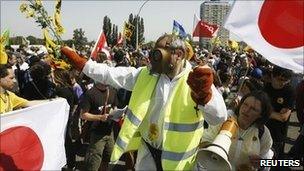Anti-nuclear protests in Germany and France
- Published

Thousands of people in France and Germany have staged protests calling for an end to nuclear power.
Marches were held on several river bridges between France and Germany over the Rhine while there were further protests at German nuclear plants.
The protests come on the eve of the 25th anniversary of the nuclear disaster at Chernobyl in Ukraine.
Japan is currently struggling to contain radiation at the quake- and tsunami-damaged Fukushima power plant.
One of the main protests in Europe took place over the Pont de l'Europe, linking France and Germany over the Rhine between Strasbourg and Kehl.
People waved banners with anti-nuclear slogans and chanted: "Chernobyl, Fukushima, never again!"
As a siren wailed, the protesters threw flowers on to the Rhine and lay down on the pavement of the bridge in what they termed a symbolic "die in".
Protesters were also calling for the closure of France's oldest nuclear power station, at Fessenheim.
'Real danger'
Several thousand people also protested at a number of nuclear power stations in Germany, including Biblis, Grohnde and Grafenrheinfeld.
"After Fukushima it's now clear enough that the danger of nuclear power is real," said Erhard Renz, one of the organisers of the Biblis demonstration.
"We can not allow the business needs of the very few to destroy our world - like what happened 25 years ago," he told German broadcaster Deutsche Welle.
The anti-nuclear movement had already been particularly strong in Germany, even before Japan's nuclear accident, says the BBC's Europe correspondent Matthew Price, in Brussels.
In recent weeks tens of thousands of people have staged demonstrations.
It has become a political issue, says our correspondent, helping the German Green party to victory in regional elections, and further damaging the standing of Chancellor Angela Merkel.
Meanwhile in India, security has been tightened around Jaitapur, where protesters are planning to march on the site of a planned six-reactor nuclear power plant.
Campaigners against the power station, on the west coast of India, have been given a boost by the radiation leaks at Fukushima.
Radiation plume
It was on 26 April 1986 that the power station at Chernobyl, then part of the Soviet Union, exploded in the world's worst nuclear accident.
The accident sent a plume of radiation over a large part of Europe.
At least 30 people were killed in the immediate aftermath of the explosion at its Number Four reactor - though others died later from radiation-related sicknesses such as cancer.
The number has been fiercely debated.
Soviet officials held off reporting the accident for several days.
The operators of the Fukushima plant, Tokyo Electric Power Co, have also come under fire for not quickly disclosing information on radiation leaks from the plant.
Russian President Dmitry Medvedev said there must be greater transparency in nuclear emergencies.
"I think that our modern states must see the main lesson of what happened at Chernobyl and the most recent Japanese tragedy as the necessity to tell people the truth," he told survivors of the clean-up effort at a meeting in the Kremlin.
He is to visit Chernobyl on Tuesday, as will Ukraine's Prime Minister Viktor Yanukovich.
Hundreds of thousands of people were evacuated from their homes in Ukraine, western Russia and Belarus after the accident.
There is still a 30km (19 miles) exclusion zone around the plant.
Soviet engineers encased the damaged reactor in a temporary concrete casing to limit the radiation but a new shield is needed.
A donors conference in Kiev, Ukraine, last week raised 550m euros ($798m) of the 740m euros needed to build a new shelter and a storage facility for spent fuel.
- Published12 September 2011
- Published21 July 2011
- Published23 March 2011
- Published18 March 2011
- Published19 April 2011
- Published12 March 2011
- Published28 September 2010